 Amphibious armored vehicle unit conducts open sea drill
Amphibious armored vehicle unit conducts open sea drill
 Water relay in Henan
Water relay in Henan
 Ethnic culture feasts eyes of travelers
Ethnic culture feasts eyes of travelers
 80 security dogs assembled in Nanjing police dog training base
80 security dogs assembled in Nanjing police dog training base
 Graffiti artists paint on street walls in Xinjiang
Graffiti artists paint on street walls in Xinjiang
 Story of ceramic artist Zhang Lingyun
Story of ceramic artist Zhang Lingyun
 Magic summer night dream in Hongyuan
Magic summer night dream in Hongyuan
 Incredible creatures in headwaters drainage region of Lancang River
Incredible creatures in headwaters drainage region of Lancang River
 The future of rock n' roll seen in young rockers in China
The future of rock n' roll seen in young rockers in China
 Magnificent Yanziya Cliff
Magnificent Yanziya Cliff
TOKYO, Aug. 14 -- 69 years on, the sentiments among Japanese people toward the day of Japan's unconditional surrender to the Allies at the end of World War II are still mixed.
While some are reflecting on the lessons of the war, historical revisionists led by Abe's administration are bucking the trend and sticking to its rightist path.
As we mark the 69th anniversary of the V-J day (Victory over Japan Day) on Friday, it is time to consider the historic meaning of Aug. 15 and to correct the lies.
A DAY OF REBIRTH
For most Japanese, Aug. 15 is a day of both infamy and rebirth, as it on one hand marks the defeat of Japan, while on the other, marks the rebirth of Japan, from militarism to democracy.
But for Japanese veteran soldier Nobuo Okimatsu, rebirth is the more important of these, as he was literally saved that day by the surrender of his country.
69 years ago, then 20-year-old Okimatsu was a Kamikaze pilot in the Japanese army during its aggression against China and other Asian countries. After training for three months, he, along with other soldiers, were tasked with the mission to carry out a suicidal crash into the Allies' ships.
Their mission was accidentally delayed on Aug. 15, 1945, when the airport that their flight was scheduled to divert from was bombed.
Events turned miraculous for Okimatsu that noon when Japanese Emperor Hirohito declared the acceptance of the provisions of the Potsdam Proclamation, and Japan's unconditional surrender.
"I was saved!" Okimatsu exclaimed, at the time secretly congratulating himself.
After the war ended, Okimatsu joined the "815 Japan-China Friendship Association," an anti-war organization founded by a group of Japanese veterans who had taken part in the aggression.
The organization also calls on people to face up to Japan's wartime history, a base point in historic cognition.
Okimtsu now is the representative director of the association. The 89-year-old still actively participate in speeches and lectures, telling more Japanese of bitter war memories and conveying his reflections.
To Okimtsu and other members of his organization, Abe's visiting of the Yasukuni Shrine, where WWII war criminals are honored, and move to lift the ban on exercising the right of collective self-defense are rowing against the tide.
 |
 Beijing policewomen posters become a hit
Beijing policewomen posters become a hit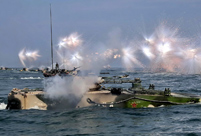 Armored regiment trains on the sea
Armored regiment trains on the sea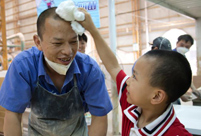 Children spend 'Father's Day' with dads at work
Children spend 'Father's Day' with dads at work 'Pan Da' appear in Shanghai World Financial Center
'Pan Da' appear in Shanghai World Financial Center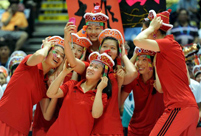 Champions take selfies on podium
Champions take selfies on podium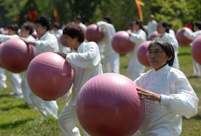 National Fitness Day celebrated around China
National Fitness Day celebrated around China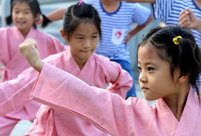 Traditional culture colors summer vacation
Traditional culture colors summer vacation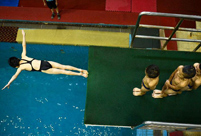 Young athletes fighting for their dreams
Young athletes fighting for their dreams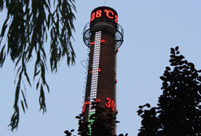 68 meters high thermometer in Shanxi, called ‘fighter’ of thermometers
68 meters high thermometer in Shanxi, called ‘fighter’ of thermometers The vanishing folk skills
The vanishing folk skills Intoxicating beauty of Dali, Yunnan province
Intoxicating beauty of Dali, Yunnan province Memorable moments of Ludian earthquake
Memorable moments of Ludian earthquake Bring world together to help elephant
Bring world together to help elephant 'Building Dreams'
'Building Dreams'  Labrang Monastery
Labrang MonasteryDay|Week|Month